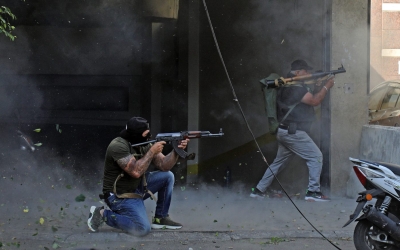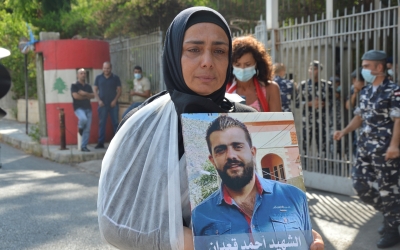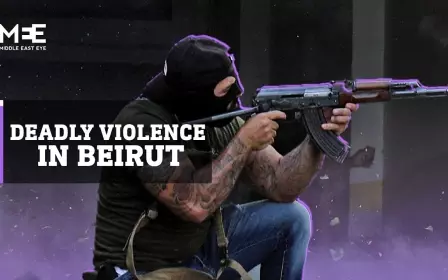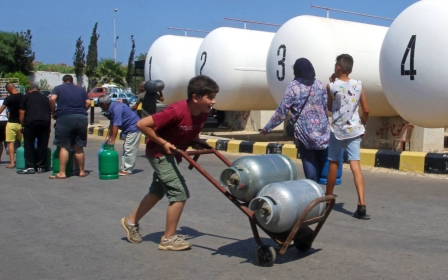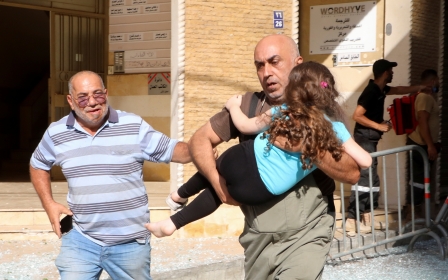US announces additional support for Lebanon's army as violence rocks Beirut
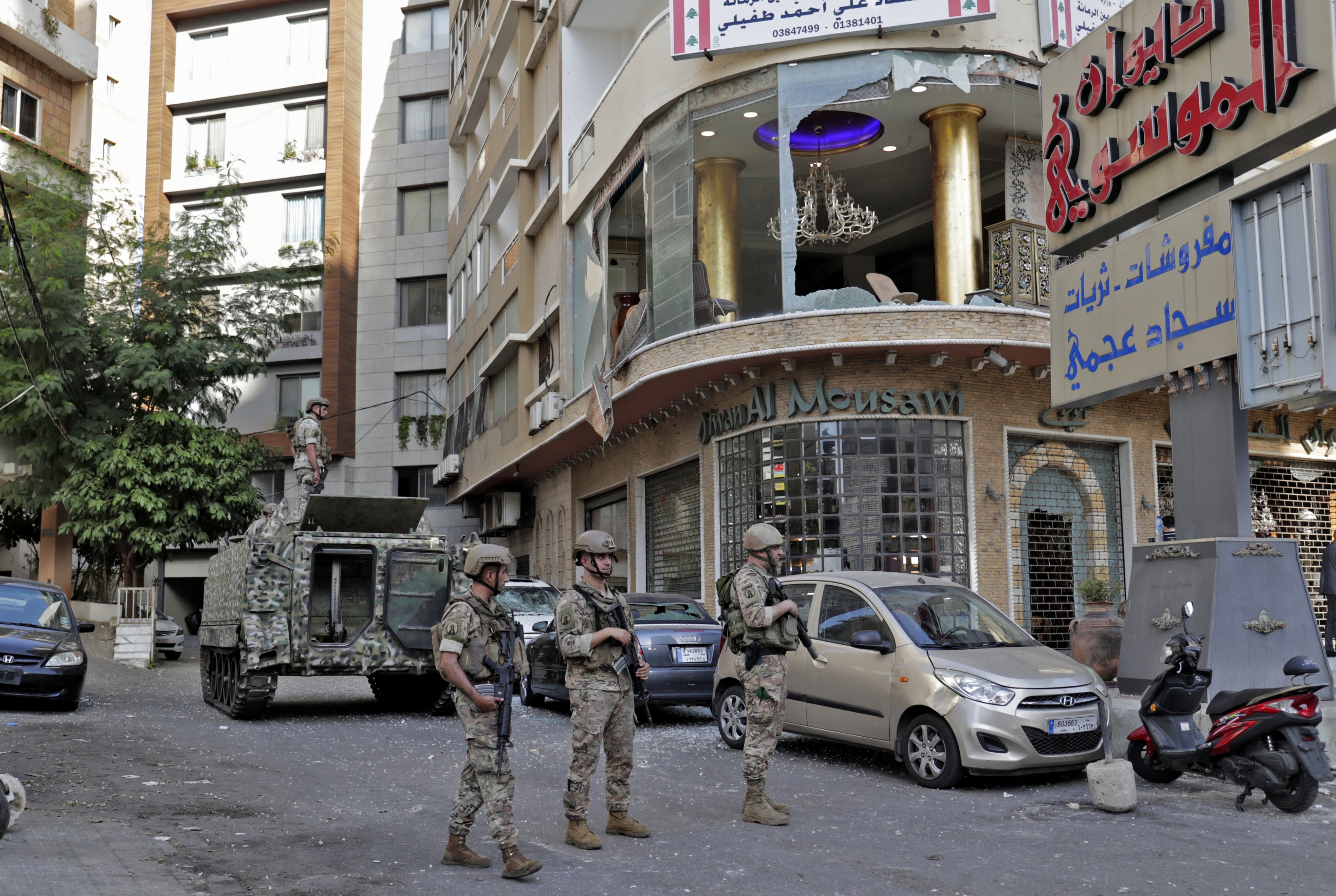
The United States will offer an additional $67m to support the Lebanese army, US Under Secretary of State Victoria Nuland said in Beirut on Thursday, during a visit that was overshadowed by deadly clashes in the capital.
Nuland, who was visiting Lebanon as part of a pre-planned tour, was speaking at a press conference the same day fighting erupted between Hezbollah supporters and unidentified gunmen, resulting in the deaths of at least six people and several casualties.
"I'm pleased to announce an additional $67 million in new US support for the Lebanese army, bringing our total of support this year to $187 million," Nuland told reporters.
Thursday's fighting was some of the worst Lebanon has seen in years. Authorities said the bloodshed was a result of gunfire on protesters taking part in a demonstration organised by Hezbollah and its political ally, Amal, against an investigation into the Beirut port blast.
Demonstrators had gathered to demand the removal of the judge investigating the explosion which devastated large parts of the city and left over 200 people dead.
New MEE newsletter: Jerusalem Dispatch
Sign up to get the latest insights and analysis on Israel-Palestine, alongside Turkey Unpacked and other MEE newsletters
"We join the Lebanese authorities in their call for calm and deescalation of tensions," she said.
She also highlighted US support for an independent judiciary in Lebanon and the investigation into the port explosion led by Judge Tarek Bitar.
Earlier this month, the Beirut Appeals Court rejected requests to remove Bitar from the Port Blast investigation, which were presented by former ministers charged in the inquiry.
Bitar is the second judge to lead the investigation after his predecessor was removed by a similar complaint. While families of victims have repeatedly demonstrated in support of Bitar, Hezbollah, the most powerful political force in the country, has accused him of political bias, claiming he is targeting the group and its government allies.
The Lebanese Armed Forces (LAF) was later deployed to the Tayouneh-Badaro neighbourhood of the city, where fighting erupted. The area, where Christians and Shia and Sunni Muslims live in close proximity, was an early flashpoint in the country's 1975-1990 civil war which divided Beirut along sectarian lines.
The US began its assistance programme to the LAF after the 2006 war between Israel and Hezbollah and has since provided the force with more than $2.5bn in support. It remains, by far, the single largest donor to the 80,000-strong organisation.
The LAF remains one of the few institutions in Lebanon still trusted by the country's vast array of 18 different sects, and its training has been heavily influenced by the US.
"Our assistance supports the Lebanese Armed Forces' ability to secure Lebanon's borders, counter internal threats, and defend the Lebanese people," a spokesperson for US Special Operations Command Central, told MEE.
"Our strategy is to forge the strongest alliance possible between our military forces," the spokesperson added.
While the force has been credited with successes, such as ousting Islamic State militants from the country in 2017 and rejecting calls by Hezbollah-backed politicians to suppress protestors in 2019, it has also come under fire for not doing enough to route out Hezbollah sympathisers within its ranks or take steps to disarm the Iran-backed group.
'The hands of Hezbollah'
US Congressman Lee Zeldin told MEE in August that any funding should be tied to the "LAF upholding its end of the bargain" to address Hezbollah's stranglehold on the Lebanese state and proliferation of weapons.
"[Hezbollah's] continued power and influence over the LAF presents a constant threat,” Zeldin told MEE.
"Stronger steps need to be taken to ensure that American resources directed to the LAF are not ending up in the hands of Hezbollah," the Republican congressman added.
Since the end of Lebanon's civil war, Hezbollah has grown as a parallel state within Lebanon and its military wing fields the country's second-largest armed force and reportedly boasts an arsenal of 150,000 rockets and missiles.
The availability of arms in Lebanon was on full display Thursday as Hezbollah supporters fired AK-47's and RPG's at the unidentified gunman who opened fire on them.
But many are concerned that if the US pulls its support the LAF will collapse and be unable to provide any type of security, leaving a power vacuum in the impoverished country.
"The LAF is one of the last state institutions in Lebanon that has not been totally compromised by Hezbollah and that is in large part due to US support," Aram Nerguizian, a security consultant who works on Lebanon and is a senior associate with the Center for Strategic and International Studies, told MEE.
"There is nobody worth their salt in the LAF who doesn't appreciate the impact of the United States," he added.
The infusion of an additional $67m to the LAF comes as the military deals with the impact of the country’s financial collapse.
Its budget, which has stayed relatively stable at around 2.8b Lebanese pounds between 2018 and 2021, has sunk almost 90 percent in real-world terms with the devaluation of the country's currency.
As a result, Lebanese soldiers have seen their salaries drastically reduced, and fears have heightened that they may walk away from their posts. A typical recruit is paid around $84 a month, a more than 87 percent drop in pay compared to before the crisis.
"The deteriorating economic and financial situation in Lebanon will inevitably lead to the collapse of institutions, including the military, and therefore the entire country’s security will be exposed," General Joseph Aoun, the country’s top military commander, warned earlier this year.
Middle East Eye delivers independent and unrivalled coverage and analysis of the Middle East, North Africa and beyond. To learn more about republishing this content and the associated fees, please fill out this form. More about MEE can be found here.


